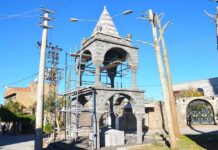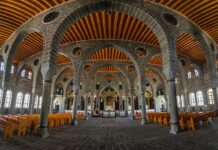Pliny The Younger (62—II3 A.D.)
The Letters of Pliny the Younger (known in Latin as C. Plinius Caecilius Secundus) give a pleasant and varied picture of Roman life at a time when the satirists were depicting it in lurid hues. Pliny was a gentleman of refinement who found time, in spite of his career as a lawyer and a high government official, to write many letters to his friends, with a view, as we happen to know, to publication. Several of these letters are neither more nor less than short stories. The Haunted House is simply the recital of an incident in a letter to his friend Sura, and is one of the best of the ancient ghost stories. Needless to say, it is a type that has been used time and again.
The text is from an early English translation, and comprises Letter 27 of the Seventh Book. There is no title in the original.
The Haunted House
There was at Athens a mansion, spacious and commodious, but of evil repute and dangerous to health. In the dead of night there was a noise as of iron, and, if you listened more closely, a clanking of chains was heard, first of all from a distance, and afterwards hard by. Presently a specter used to appear, an ancient man sinking with emaciation and squalor, with a long beard and bristly hair, wearing shackles on his legs and fetters on his hands, and shaking them. Hence the inmates, by reason of their fears, passed miserable and horrible nights in sleeplessness.
This want of sleep was followed by disease, and, their terrors increasing, by death. For in the daytime as well, though the apparition had departed, yet a reminiscence of it flitted before their eyes, and their dread outlived its cause. The mansion was accordingly deserted and, condemned to solitude, was entirely abandoned to the dreadful ghost. However, it was advertised, on the chance of some one, ignorant of the fearful curse attached to it, being willing to buy or to rent it. Athenodorus the philosopher came to Athens and read the advertisement. When he had been informed of the terms, which were so low as to appear suspicious, he made inquiries, and learned the whole of the particulars. Yet none the less on that account, nay, all the more readily, did he rent the house. As evening began to draw on, he ordered a sofa to be set for himself in the front part of the house, and called for his notebooks, writing implements, and a light.
All his servants he dismissed to the interior apartments, and for himself applied his soul, eyes, and hand to composition, that his mind might not, from want of occupation, picture to itself the phantoms of which he had heard, or any empty terrors. At the commencement there was the universal silence of night. Soon the shaking of irons and the clanking of chains was heard, yet he never raised his eyes nor slackened his pen, but hardened his soul and deadened his ears by its help. The noise grew and approached: now it seemed to be heard at the door, and next inside the door. He looked round, beheld and recognized the figure he had been told of. It was standing and signaling to him with its finger, as though inviting him. He, in reply, made a sign with his hand that it should wait a moment, and applied himself afresh to his tablets and pen. Upon this the figure kept rattling its chains over his head as he wrote. On looking round again, he saw it making the same signal as before, and without delay took up a light and followed it. It moved with a slow step as though oppressed by its chains, and after turning into the courtyard of the house vanished suddenly and left his company.
Intermingle
On being thus left to himself, he marked the spot with some grass and leaves which he plucked. Next day he applied to the magistrates, and urged them to have the spot in question dug up. There were found there some bones attached to and intermingled with fetters; the body to which they had belonged, rotted away by time and the soil, had abandoned them thus naked and corroded to the chains. They were collected and interred at the public expense, and the house was ever alterwards free from the spirit, which had obtained due sepulture. I believe on the strength of those who affirm it. What follows I am myself in a position to affirm to others. I have a ireedman, who is not without some knowledge of letters.
A younger brother of his was sleeping with him in the same bed. The latter dreamed he saw some one sitting on the couch, who approached f Pair of scissors to his head, and even cut the hair from the crown of it. When day dawned he was found to be cropped round the crown, and his locks were discovered lying about. A very short time afterwards a fresh occurrence of the same kind confirmed the truth of the former one. A lad of mine was sleeping, in company with several others, in the pages apartment. There came through the windows (so he tells the story) two figures in white tunics, who cut his hair as he lay, and departed the way they came. In his case, too, daylight exhibited him shorn, and his locks scattered around. Nothing remarkable followed except, perhaps, this, that I was not brought under accusation, as should have been, if Domitian (in whose reign these events happened).
For ln his desk was found an information against me which had been presented by Cams; from which circumstance it may be conjectured inasmuch as it is the custom of accused persons to let their hair grow—that the cutting off of my slaves` hair was a sign of the danger which threatened me being averted.
I beg, then, that you will apply your great learning to this subject.
The matter is one which deserves long and deep consideration on your part; nor am I, for my part, undeserving of having the fruits of your wisdom imparted to me. You many even argue on both sides (as vour way is), provided you argue more forcibly on one side than the other so as not to dismiss me in suspense and anxiety, when the very cause of my consulting you has been to have my doubts ended.
Read More about A Ball part 5








